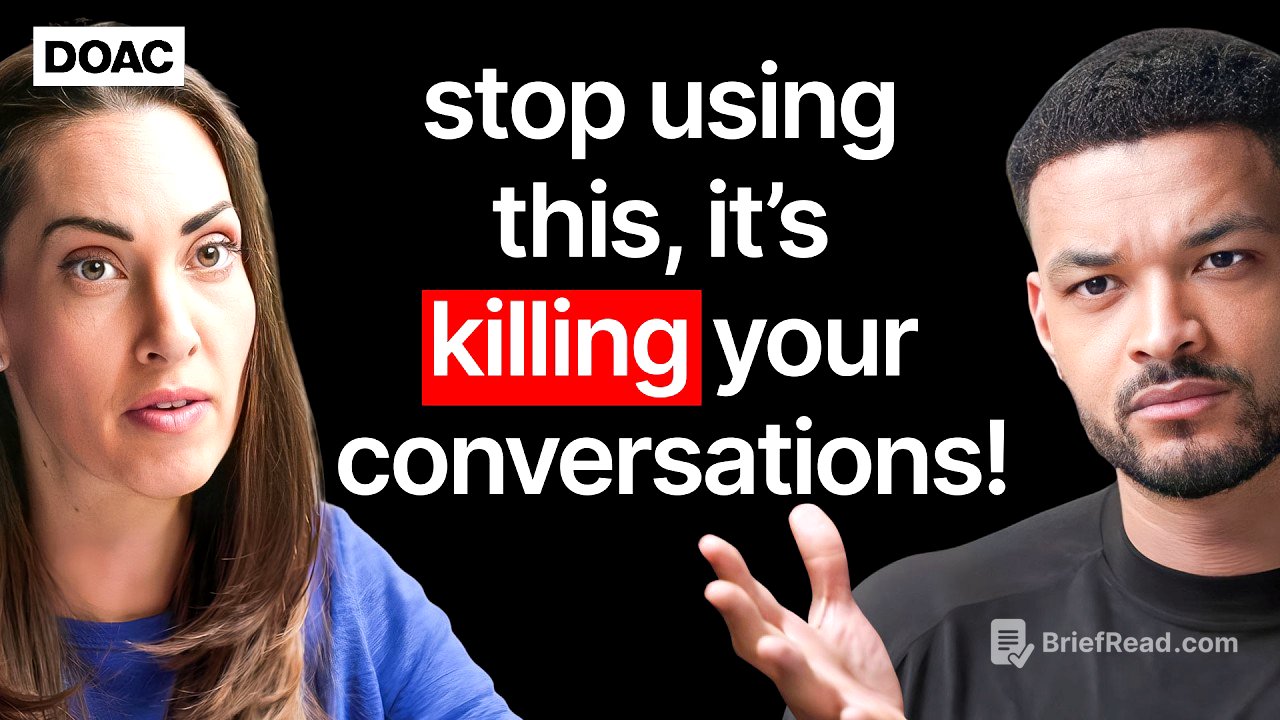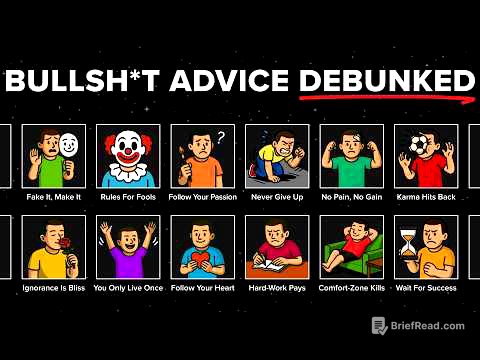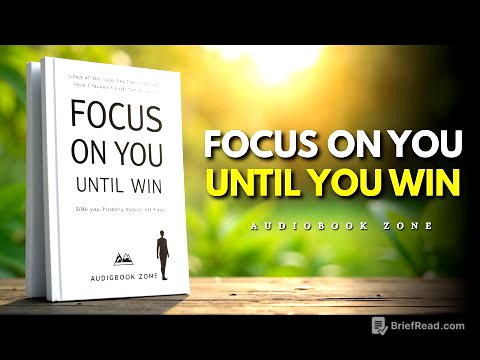TLDR;
This YouTube video features Vanessa Van Edwards, a behavioral investigator, discussing the hidden language of cues used by successful people. She emphasizes the importance of warmth and competence in communication, highlighting how understanding and controlling these cues can significantly impact various aspects of life, from relationships to career advancement. The conversation covers a wide range of topics, including body language, vocal tones, word choice, and even the influence of the environment on interpersonal interactions.
- Cues are a hidden language of successful people.
- Warmth and competence are key to positive impressions.
- Understanding and controlling cues can improve relationships and career.
Intro [0:00]
The video introduces Vanessa van Edwards, a behavioral investigator who uses science-backed research to help people build confidence and create authentic relationships. She explains that highly successful people understand and use a hidden language of cues, which involves body language, micro-expressions, and vocal tones. Edwards emphasizes that mastering these cues is essential for success in both social and professional interactions.
The Crucial Role of Cues for Success [2:13]
Vanessa van Edwards asserts that successful individuals are adept at using and interpreting cues, which are critical for effective communication. She quantifies this by stating that 82% of first impressions are based on warmth and competence. By controlling these cues, individuals can become more memorable, confident, and have clearer communication, positively impacting friendships, partnerships, and careers.
I'm a Recovered Awkward Person [3:45]
Vanessa shares her personal journey from being an awkward person to becoming a communication expert. She used to believe charisma was innate until she discovered a 2002 study proving it could be learned. This inspired her to research and develop frameworks for conversation and social connection. Over the past 12 years, she has helped 400,000 students master these frameworks to overcome awkwardness and achieve their personal and professional goals.
What's an Ambivert [5:36]
Vanessa defines an ambivert as someone who gains energy from the right people in the right places. Ambiverts can dial up their extroversion when needed but require recharge time afterward. Knowing whether you're an ambivert is important for optimizing your social battery by identifying people and places that drain or energize you.
One Word Can Change the Way People Think [7:28]
Vanessa discusses the power of words, citing a study where participants playing a game labeled "Community Game" were more collaborative than those playing the same game labeled "Wall Street Game." This highlights how even a single word can influence people's thoughts and actions. She suggests using words in emails, texts, and headlines that cue people to feel or think a certain way, setting them up for success.
The Most Fundamental Skill to Invest In [9:39]
Vanessa emphasizes that people skills are the most fundamental skill one can invest in, essential for success in life, love, and business. She argues that without people skills, even the smartest individuals will struggle to succeed. She shares that her most extreme students are often those who are very smart but lack awareness of the cues they send, leading them to shut down and become unreadable.
The Resting B*tch Face Effect [12:41]
Vanessa introduces the concept of "resting bothered face" (RBF), explaining that everyone has a default facial expression at rest. She encourages viewers to identify their resting face, whether it appears sad, angry, or afraid, and to counteract it with conscious cues. She shares her personal experience of having a sad resting face and how she uses makeup and facial expressions to appear happier.
Do Not Fake Smile! [16:01]
Vanessa advises against fake smiles, citing a study that showed they do not improve mood. She explains that the only true indicator of happiness is when the cheek muscles are activated. She recommends either smiling authentically or remaining neutral rather than forcing a smile.
The 97 Cues to Be Warm & Competent [18:29]
Vanessa explains that while having a resting bothered face can be exhausting, it's important to choose cues purposefully. She has identified 97 cues that are most important for being warm and competent, allowing individuals to create their own recipe for charisma. She emphasizes that one doesn't need to be a bubbly extrovert to be charismatic; they can be a quiet, powerful introvert or a compassionate, empathetic healer.
The Formula to a Perfect Conversation [21:44]
Vanessa recounts her college experience where she struggled with group work, leading her professor to suggest she study people like she studies science. This inspired her to research conversation and create conversational blueprints and formulas. She realized that connecting with others required tools and experiments, which helped her feel more like herself and make friends.
Science Reveals Why Some People Are Extremely Popular [24:37]
Vanessa discusses a study by Dr. Van Sloan that identified the key trait of popular kids: they had the longest list of people they liked. This means being likable isn't about self-control but about being a "first liker." She introduces three magic phrases for likeability: "I was just thinking of you," "You're always so [positive adjective]," and "Last time we talked, you mentioned..."
Message People Telling Them This... [28:34]
Vanessa addresses concerns about the "I was just thinking of you" phrase sounding exhausting or time-consuming. She clarifies that it should only be used when naturally occurring and doesn't require lengthy conversations. She introduces three levels of intimacy: acquaintances, personal concerns, and self-narrative, suggesting that these phrases should be used to level up relationships with people you want to invest in.
The Luck Experiment [33:22]
Vanessa introduces the concept of self-narrative, which is the story we tell ourselves about ourselves. She identifies three main types: hero, healer, and victim. She shares a "luck experiment" by Dr. Richard Wiseman, where people who perceived themselves as lucky saw more opportunities. She believes it's possible to change one's perception of themselves by taking small moments of heroism and changing negative self-perceptions.
Being Around Successful People Is Contagious [35:05]
Vanessa discusses a study showing that sitting within 25 feet of a high performer improves one's performance by 15%, while sitting near a low performer decreases it by 30%. This highlights the importance of surrounding oneself with positive and motivated individuals. She also shares a study on sweat, revealing that fear sweat can trigger a fear response in others, emphasizing the importance of following one's gut.
The Importance of Hand Gestures [41:55]
Vanessa emphasizes the importance of hand gestures, referencing her TED Talk on the subject. She explains that hands show intention and that people are more engaged when speakers use hand gestures to outline their points. She cites a study that found viral TED speakers used an average of 465 hand gestures in 18 minutes, compared to 271 gestures by less popular speakers.
Hand Tricks to Be Liked [43:38]
Vanessa shares that humans love seeing someone's palm, as it makes them feel open and safe. She also discusses the importance of vocal variety, explaining that good speakers use different tones to signal different types of information. She recommends chairs without arms to encourage more expressive hand gestures and emphasizes the importance of maintaining the perfect distance between two people having a conversation.
The Scientific Formula to Be More Charismatic [54:15]
Vanessa defines charisma as being both highly warm and highly competent. She explains that charismatic people signal trust, likeability, reliability, and capability. She notes that people can lean higher on either warmth or competence, and it's important to dial up the cues that are lacking.
The Danger Zone of Being Too Warm or Competent [56:47]
Vanessa explains that the danger zone is being low in both warmth and competence, leading people to distrust you. Too much competence without warmth can make people suspicious, while too much warmth can diminish competence.
The Power Cues [58:45]
Vanessa shares five power cues for competence: the steeple gesture, maximizing the distance between the earlobe and shoulder, making eye contact at the end of sentences, using a lower lid flex, and using a downward vocal inflection. She explains that these cues can help people be taken more seriously and project confidence.
How to Spot a Liar [1:07:55]
Vanessa reveals that most people can only spot a lie with 54% accuracy, emphasizing the importance of giving people the benefit of the doubt. She shares statistical cues to deceit, including the question inflection, a volume drop, and incongruent body language. She also notes that liars often show disgust with themselves for lying.
If You've Been Told You're Intimidating, Do This [1:15:23]
Vanessa shares five warmth cues for those who have been told they are intimidating: using a triple nod, tilting the head, smiling authentically, leaning in, and using non-verbal bridges. She explains that these cues can help people appear more approachable and empathetic.
Don't Let Anyone Use This With You [1:18:37]
Vanessa warns against a manipulative trick where someone moves their hand in a nodding motion to get others to agree with them. She advises viewers to be aware of this tactic and not let anyone use it on them.
The 6 Questions to Connect With Someone [1:21:45]
Vanessa shares six questions to level up relationships: "Are you working on anything exciting recently?", "What's your biggest goal right now?", and "What book, movie, or TV character is most like you and why?" She explains that these questions can help people connect on a deeper level and uncover their self-narrative.
Leaning Too Much Towards Someone... [1:34:20]
Vanessa cautions against leaning in too much, as it can signal low value or subservience. She emphasizes that all cues should be used as highlights or emphasis, not as constant behaviors.
How to Greet Someone [1:39:03]
Vanessa provides tips for signaling the desired greeting, such as a handshake or hug, from the moment someone is first seen. She explains that clear non-verbal cues can prevent awkward greetings. She also shares her personal experience of a failed pitch due to offering a hug, leading her to always offer her hand first.
How to Master Messaging [1:49:42]
Vanessa emphasizes the importance of purposeful movement on stage, advising speakers to block their speeches and use stage movement to help the audience organize and categorize their talks.
Personal Branding [1:54:40]
Vanessa discusses personal branding, emphasizing the importance of triggering the right neural networks with visual cues. She advises individuals to create profiles that attract their ideal audience and create allergies for the wrong people.
Improve Your Dating Life With These Tips [1:59:01]
Vanessa provides tips for improving one's dating life, including using pictures that attract the right person, showing warm and competent body language, and avoiding vocal fry. She recommends activity dates to help people be more broad and comfortable.
Body Language and Brain Connection [2:04:27]
Vanessa shares a study showing that women activate more areas of their brain than men when reading body language. She explains that women tend to globalize cues, while men focus on specific cues.
Are You Awkward? Watch This [2:06:33]
Vanessa emphasizes that anyone can learn these tactics and tips, regardless of their natural charisma. She believes that these tools can give people the confidence to try something new and break their patterns.
How to Get Someone to Approach You [2:10:14]
Vanessa explains that the most important thing for attracting someone is signaling availability. She recommends using open body language, croissant feet, and quick darting glances. She also shares a secret trick of gesturing in the direction of the person you want to approach.
How to Make Friends as an Adult [2:15:08]
Vanessa shares a framework for making friends as adults, emphasizing the importance of dating your friends and finding people with similar values. She recommends going on friendship dates and testing out values.
AirPods Are Killing Friendships [2:18:57]
Vanessa expresses concern about the impact of AirPods on interpersonal relationships, explaining that they reduce micro-moments of connection. She emphasizes the importance of weak ties and casual connections for happiness and success.
How to Spot a Liar [2:24:08]
Vanessa reiterates that most people are bad at spotting liars and emphasizes the importance of giving people the benefit of the doubt. She shares statistical cues to deceit, including the question inflection, a volume drop, and incongruent body language.
Toxic Relationships [2:30:05]
Vanessa explains that ambivalent relationships, where one is unsure of the other person's feelings, are the most damaging. She emphasizes the importance of either moving ambivalent relationships up or moving them out.
How to Start a Conversation With a Stranger [2:32:34]
Vanessa advises against overthinking the opener, suggesting a simple "Hey, I'm Vanessa." She recommends asking a version of the excitement question, such as "Did you do anything fun and exciting this past weekend?"
How to Get Started With All This Knowledge [2:37:00]
Vanessa advises viewers to break autopilot by avoiding common conversation starters and asking better questions. She encourages them to find out where they fall on the warmth and competence scale and to seek feedback from others. She concludes by sharing a story about Harry S. Truman, emphasizing the importance of creating rooms where one can exercise their social strengths.









